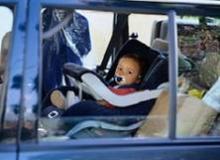We can all exhale now, because Kim Kardashian and Kanye West have had their baby, a girl. The sex was not a surprise, since Kim announced it during the premier of season 8 of Keeping Up With the Kardashians (Eight seasons already? Golly, it seems like 12!). “Like, who doesn't want a girl? They're the best!” she said, adding quietly, “except for boys. They’re also the best. And hermaphrodites, because if girls are the best and boys are the best, then well, you know..." Updates have been lacking as to the size and health of the newborn, who is 5 weeks premature, but I suspect the couple is just waiting to file a report until they complete the peer-review process at People: Neonatology.
Thin kin
Have you heard the maxim, “What doesn’t kill you makes you scarred for life?” Neither have I, probably because it’s not all that catchy. And yet, as we learn more about the long-term health effects of childhood trauma, it seems to apply. Now we hear that children who are bullied by their siblings suffer just as much if not more psychological trauma than do those who are victimized by their peers. And all along I had hoped it was character building.
To me, the biggest surprise in the randomized telephone survey of 3,599 families was that only 32% of children interviewed reported being assaulted, insulted, or intimidated by a sibling in the past year. In my household of five children, I feel lucky if they spend 32% of the time being pleasant to each other. The researchers, led by Corinna Jenkins Tucker, Ph.D., of the department of family studies at the University of New Hampshire in Durham, asked things like whether a child’s sibling had taken away their property or intentionally broken or ruined something the responder owned, a question that could not possibly have been thought up by an only child.
The team also asked about participants’ experiences of nonsibling assault, property victimization, psychological victimization, child maltreatment, sexual victimization, school and Internet victimization, and witnessing family and community violence, all just to make sure that siblings didn’t get wrongly blamed for psychological damage. (They just didn’t want to hear, “But I swear, it wasn’t me!”) The results were compelling, causing me to lay down some new rules around our house, specifically that none of the kids may speak, touch each other, take each other’s stuff, or make eye contact until the youngest is old enough to pay for his own mental health coverage.
Unlike
Do you especially hate those people on Facebook who seem to want to put all their friends to some moral test? “I know only some of you will be brave enough to do this, but if you really think world hunger is bad, you’ll repost this picture of a sad puppy.” There are few moral absolutes, but I think 99% of us can agree that certain things are undesirable, for example, dog-fighting, slavery, and child abuse. (If you disagree, please don’t Friend me on Facebook.) The question is, short of reposting someone’s picture in social media, what can we really do about it?
I can’t speak to dogs or slavery, but when it comes to doctors trying to detect and prevent child abuse, it seems we can’t do as much we’d hoped, at least according to a new analysis from the U.S. Preventive Services Task Force. More specifically, the study looks at interventions for children who do not yet show signs of child abuse -- if the USPSTF started evaluating treatments rather than screening tools, it would be called the Cochrane Collaborative and would have to adopt a pretentious British accent.
So far, no question, exam finding, or counseling has proven effective at detecting and preventing child abuse, but while the literature review was comprehensive, they’ve only begun to evaluate leaked documents from the National Security Agency. If the NSA can thwart dozens of terrorist attacks as they claim, perhaps they know how to stop kids from being terrorized in their own homes? Of course, the USPSTF also hasn’t tested the power of the sad puppy photo...
Using some restraint
Do you ever think you’re speaking clearly only to find that you must have been mumbling? According to my kids I always swallow my words when I try to say, “Turn off the TV.” This sort of phenomenon might explain why, in a new review of car safety from the Journal of the Academy of Orthopedic Surgeons, only 42% of parents with 4- to 6-year-old children were following recommendations for appropriate car restraints for their children. A mere 46% of parents of children in this age group reported ever hearing that their kids should be properly restrained.
These statistics are only disturbing if you oppose child injury and death, which any of my Facebook friends can tell you I do. I think, however, that I have a solution that would get the booster seat message out to 99% of the population and also buff the image of at least one borderline celebrity. When Kim Kardashian finally releases the first photos of her baby to the public, the infant should be wearing a stylish designer onesie emblazoned with the words, “Keep all children in booster seats until they are 8 years of age or 58 inches tall.” How jealous would that make Beyoncé?!


